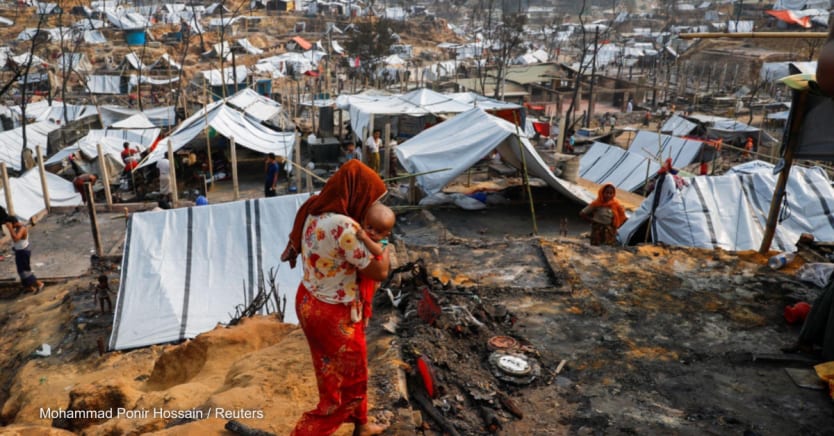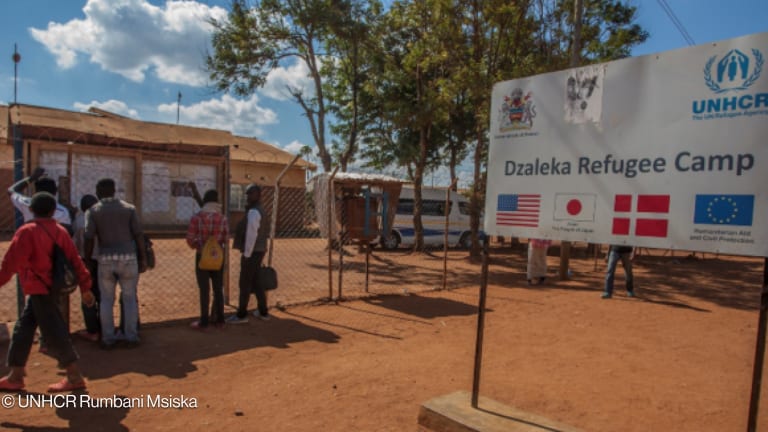
Rife with violence and a risk of kidnapping. Organized crime and arson. A lack of food and scant medical supplies. This is life in the Rohingya refugee camps, according to a new report by the Burma Human Rights Network.
Over 700,000 Rohingya people fled the Myanmar state of Rakhine in 2017 amid religious persecution from the Myanmar military. Since then, neighboring Bangladesh has sheltered the majority, alongside refugees who had fled Myanmar prior, in the Cox’s Bazar region. But conditions inside the “largest and most densely populated” camps in the world are deteriorating, according to the report.
“How long will the good deed that Bangladesh performed in 2017 by opening the borders be allowed to justify a growing list of abuses against the Rohingya happening in the camps?”
— Phil Robertson, deputy Asia director, Human Rights WatchOut of the 29 refugees BHRN interviewed from 10 different Cox’s Bazar camps, all reported violence as being an issue, 93% said they didn’t have enough food, and 50% noted a lack of medical resources.
“The food [and] health care is very poor. They live in a very inappropriate environment,” said Hajee Ismail, a Rohingya refugee and managing director of the Rohingya Peace Network, speaking at an event to launch the report. “Life is miserable in the camps.”
According to the U.N. High Commissioner for Refugees, almost 890,000 Rohingya refugees live in camps in the Cox’s Bazar region. Many more could face similar circumstances, Debbie Stothard, founder and coordinator at human rights NGO ALTSEAN-Burma, said at the event, as more people flee the ongoing conflict.
Last year, the military seized power in Myanmar, ousting the democratic leader Aung San Suu Kyi, and sparking a civil disobedience movement. The subsequent violence and chaos across the country has forced many more to seek refuge in neighboring countries and made a return to home for Rohingya people unlikely to happen any time soon.
“We really need to understand that the experiences described in this report are giving us a sense of anticipation or foreboding about what might happen to other ethnic people from the country if the violence in Burma continues and if the international community does not act,” Stothard said, adding that the international community must heed the report.
The dangers of life inside the camps
Arson, kidnapping, trafficking, drugs, and fights were listed as the most common crimes in the camps. 90% of those interviewed said that kidnappings were a problem. People might be sold into slavery, kept in exchange for bribes refugees cannot pay, or sent back to Burma and put in prison, Ismail explained.
U Kya Win, founder and executive director at BHRN, said in the session that organized crime and militant groups have significant control within parts of the camps. “You cannot say or do anything against them,” he said. “Rohingya people have become a raw material for human traffickers. For them, this is a very good population to exploit.”
For women, there are additional concerns around arranged marriages, gender-based violence, and street harassment. “In the night time, [women] feel very unsafe to go to the toilet because it’s outside and they could be attacked and there isn’t any light or security for them,” Win said. Lack of menstrual hygiene products is also an issue.
“What is clear is the human rights of the Rohingya refugees are not being protected against criminal elements in the community, but the problem is also that they feel they can’t trust the Bangladesh security forces in the camp because those people too are committing rights abuses,'' Phil Robertson, deputy Asia director at Human Rights Watch, explained at the event.
The need for international action
“The question I have … is how long will the good deed that Bangladesh performed in 2017 by opening the borders be allowed to justify a growing list of abuses against the Rohingya happening in the camps?” Robertson said.
“The international community cannot allow Bangladesh to blame everything on Burma while refusing to recognize it’s doing some of the wrong things as well,” he added. “Being a host country comes with responsibility.”
Education, he said, has been prohibited in camps for fear learning the local language will prevent refugees from wanting to return to Myanmar. According to the report, all of the refugees asked said they hoped to return to Myanmar, but that it would have to be safe to do so. Robertson recommended children be educated in line with a Burmese curriculum and in the Burmese language so that they are prepositioned to return should they be able to in the future.
BHRN’s report also calls for Bangladesh to allow refugees to work or seek higher education outside the camps, increase the presence of security officials in areas associated with criminal activity, and investigate crimes against the Rohingya community.
Equally, no one should forget “the true origin of this crisis lies with the Myanmar military,” Robertson said.
The International Court of Justice will be hearing more about the Myanmar junta’s violations at the Hague later this month. There also needs to be a U.N. Security Council referral to the international criminal court, he said. “Enough of meeting behind closed doors and saying that someone constitutes progress. It doesn't. There needs to be real action.”
“When you look at the U.N., the U.N. Security Council isn’t doing much with a resolution, the U.N. country team is hiding. London and the other governments in the U.N. Security Council — the U.S., France, other like minded countries in the European Union, Australia, New Zealand and others — they all need to stand up and demand that something happen,” Robertson said.
On a global level, the report recommends governments “exercise diplomatic efforts with Bangladesh to allow for the resettlement of Rohingya into third countries;” work with the United Nations to increase the food supplies and health care; and train security forces to ensure a safer environment.








